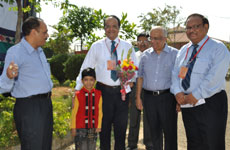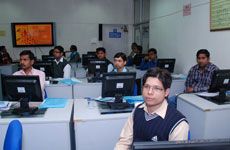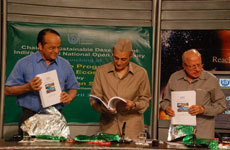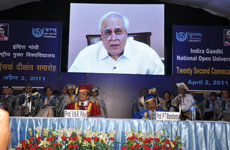The Planning Commission, Government of India, has started the process of preparing an Approach to the 12th Five Year Plan. An open consultation, involving all stakeholders, is in progress.Twelve Strategy Challenges have been identified to initiate these consultations. These Strategy Challenges, according to the Planning Commission, refer to some core areas that require new approaches to produce the targeted results.

The strategy challenges tentatively proposed by the Planning Commission are: Enhancing the Capacity for Growth, Enhancing the Skills and Faster Generation of Employment, Managing the Environment, Markets for Efficiency and Inclusion, Decentralisation, Empowerment and Information, Technology and Innovation, Securing the Energy Future, Accelerated Development of Transport Infrastructure, Rural Transformation and Sustained Growth of Agriculture, Managing Urbanisation, Improved Access to Quality Education, and Better Preventive and Curative Health Care. We will all be participating pro-actively in this dialogue initiated by the Planning Commission for a better understanding of the critical issues, to be addressed in the 12th Plan to accelerate faster, more inclusive and sustainable growth
We are in the last year of the 11th Plan, which could be aptly described as an Education Plan, considering the thrust given to educational expansion and consolidation at all levels. In terms of qualitative and quantitative growth and in strategic policy interventions, education, science and technology sectors have been in the forefront during these four years of the 11th Plan. The Education Sector Reform Agenda, which was set in motion in the last two years, has started showing results. A cursory look at the 'Twelve Strategy Challenges' would indicate the significant roles of education, skill and employability in all the other sectors as well. Improved Access to Quality Education, Technology and Innovation and Enhancing the Skills and Faster Generation of Employment are the areas of very vigorous interventions happening in the higher education institutions now. A critical overview of the strategies adopted in 11th Plan focussing on the inputs and outcomes, institution-wise and sector-wise, would greatly facilitate the future planning processes.
The completed four-year period of the 11th Plan has witnessed unprecedented growth and consolidation in the activities of the Indira Gandhi National Open University. Establishing 11 new Schools of Studies and the National Centre for Disability Studies, getting the best faculty, experienced consultants, full-time Research and Teaching Assistants (RTAs) and developing relevant new programmes for these Schools were significant achievements during this period. We could attract the best faculty and very bright and young researchers for these new disciplines, which were created through rigorous consultations with renowned experts in these socially relevant fields. The recommendations of the National Knowledge Commission, Planning Commission and Parliamentary Committee on Higher Education gave the necessary inputs for these activities. Vocational Education and Training, Extension and Development, Gender and Development, Inter-disciplinary and Trans-disciplinary Studies, Translation Studies and Training, Social Work, Foreign Languages, Journalism and New Media Studies, Performing and Visual Arts, Corporate Education, Training and Consultancy, Traditional Knowledge Systems, Convergence of Open and Distance Learning Technologies with the Conventional Systems of Education, Community College Skill Development Programme and its linking with higher education were the areas we could give a firm foundation during these four years.
The new projects and schemes like the full-time Research and Teaching Assistantships (RTA), Sustainable Development, e-Gyankosh & Flexilearn@ignou, Vertically-Integrated flexible, full-time engineering programmes, 'Gyan Deep' and 'Akashdeep' for the Indian Army and Air Force, respectively, and Rural Capacity-building through ODL and strengthening of Local Governance proved to be sustainable and value-adding.
This period has also been very fruitful for the University in its national and international networking for effective and optimal utilisation of intellectual capabilities and infrastructural facilities for providing knowledge and skills to a vast number of people in a financially sustainable way. The University has also maintained its exacting standards as the premier national resource centre for Open and Distance Learning and seamless provider of quality education, at par with other international institutions of higher learning. The University has also been unwavering in its commitment on access to education and equity in opportunities to women, Scheduled Castes and Scheduled Tribes, the rural population, remote areas, tribal regions, the differently-abled and the socially and economically weaker sections of the society. The student enrollment in IGNOU has doubled in the past four years - from 1.5 million to over three million, prompting the United Nations Educational, Scientific and Cultural Organisation (UNESCO) to declare it the largest, most diverse and inclusive institution of higher learning in the world in 2010.
The cover story in this issue of OpenLetter attempts to delineate this growth story of IGNOU, which is one of social commitment with prudence. This success is attributable to the pro-active participation of the teaching and non-teaching staff and the entire academic and administrative authorities of the University and the Ministry of Human Resource Development (MHRD). Partnering the Government in its various plan schemes and aligning and streamlining teaching and training activities with national priorities delineated by the Planning Commission in the 11th Plan helped the University to grow in the right perspective. We envision such a collaborative path in approaching the 12th Plan for Inclusive Education, Training and Capacity-Building at all levels.
With Best Wishes for a happy and productive New Year.
Click here for previous VC messages



